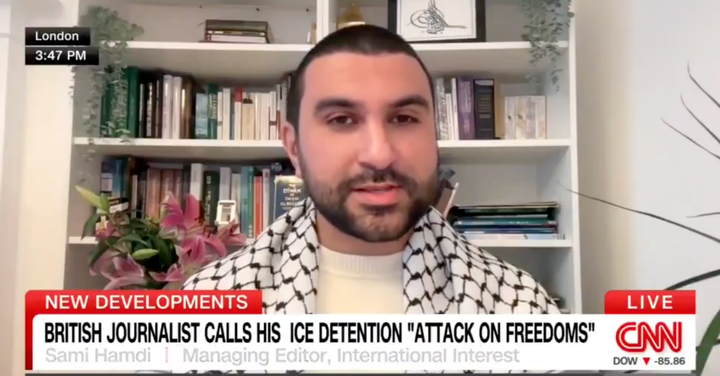US Journalist Released From Israeli Detention, Barred From Leaving Country
Police were allowed to keep reporter Jeremy Loffredo's phone and passport. He must stay in Israel until October 20.

The following article was made possible by paid subscribers of The Dissenter. Become a subscriber and support independent journalism on press freedom.
[Editor's Note: On October 21, U.S. journalist Jeremy Loffredo was deported by the Israeli police and returned to New York after being held in solitary confinement and threatened with prosecution by Israeli officials for "aiding the enemy during wartime."]
An Israeli district court ordered Israeli security forces to release American journalist Jeremy Loffredo from detention.
The police accused Loffredo of “aiding the enemy during wartime” and “providing information to the enemy” and appealed a prior court decision to grant him bail. That appeal was denied.
As reported by the Seventh Eye, an Israeli independent news publication, Loffredo had refused to allow the police to access his phone. Security forces managed to break into the phone in the past 24 hours. An Israeli police official urged the court to extend Loffredo’s detention so that they could examine the phone and collect data that would show that Loffredo committed a crime.
Judge Chana Miriam Lomp rejected this request. However, the Israeli authorities were permitted to keep Loffredo’s passport and phone, and he was barred from leaving the country until October 20. In the meantime, the Israeli police may attempt to manufacture a case against Loffredo.
The court was informed by civil rights attorney Lea Tsemel, who is representing Loffredo, that after the Israeli police appealed the bail decision they took advantage of having more time with Loffredo in their custody. He was interrogated in the night without an interpreter.
Loffredo is a freelancer and contributor to The Grayzone. Hours before Loffredo’s release, the media outlet put out a statement unequivocally rejecting the “outrageous accusations from Israeli police.”
“We stand by Jeremy's legitimate reporting. The claim that Loffredo and The Grayzone represent Israel’s enemy in wartime merely suggests that the Israeli government views the American people and free press as a legitimate target,” The Grayzone declared. “We represent no one else.”
“We will fight these charges and ask that you contact the State Department and urge them to act in defense of their citizen detained in Israel. The U.S. has an obligation to defend its journalists who are merely adhering to their ethical obligation to inform the public of pertinent facts,” the organization added.
On October 5, The Grayzone posted a video report from Loffredo on Iran’s missile strikes, which occurred on October 1. Loffredo traveled the next day to the area around the Nevatim air base in the Negev Desert and interviewed locals from a nearby Bedouin village. He also traveled to an impact site around the Mossad headquarters. His goal was to see for himself how the Israeli military and intelligence sites were damaged.
The Israeli military censor had prohibited news media from publishing particular details about the damage caused by Iranian missiles. But a reporter for Ynet, an Israeli news site, published an article on Loffredo’s detention that embedded the video report from Loffredo. This undermined the accusation from police and helped convince the court to order Loffredo’s release.
Nick Schifrin, a foreign affairs and military correspondent for PBS “NewsHour,” was also treated differently by Israeli authorities. He traveled to the impact site near the Mossad headquarters, but apparently police never questioned or detained Schifrin.
“This is the impact site for one of those Iranian ballistic missiles, and if you see the size of this crater, that’s about 30 feet deep and maybe 50 feet wide,” Schifrin reported. "You can see all the debris around here, and to give you a sense of the target for these strikes, that white building back there about 1500 feet behind me is the headquarters of the spy agency, the Mossad.”
After Schifrin posted this clip, Israeli radio news presenter Eran Cicurel responded,“I think you are breaking the Israeli censorship rules.”
Ynet reported that representatives from the U.S. Embassy attended the Jerusalem Magistrate's Court for [the October 10] hearing on the request of the police to extend his detention." But as of the morning of October 11, the State Department had yet to make any public statement about the matter.
The reason why Israeli authorities arrested and charged Loffredo instead of Schifrin—or any other international journalists who published supposedly sensitive information on Iran's strikes—may have something to do with a disinformation or smear campaign that was attempted in June against The Grayzone.
A network of current and former officials and journalists in the U.S. and Israel falsely claimed—through a story later retracted by the Washington Post—that The Grayzone had received payments from Iranian state media.
The fact that the Israeli security forces still have Loffredo's phone is alarming for anyone in Israel or the occupied Palestinian Territories, who has communicated with Loffredo.
As highlighted in a report from the Global Investigative Journalism Network in January 2023, "A law enforcement agent scrolling through a journalist’s unlocked phone is already a problematic scenario for press freedom. But this risk is supercharged by technology that can copy and search the entire content of phones and computers, sometimes even if they are locked."
“Mobile device forensics tools can recover deleted data, as well as lots of data that isn’t visible to the naked eye when scrolling,” Riana Pfefferkorn, a research scholar at Stanford Internet Observatory, told the network.
Chip Gibbons, the policy director for Defending Rights and Dissent, said, “The arrest of Jeremy Loffredo is deeply troubling. Israel, with its killing and arrest of journalists, anti-democratic military censorship and shuttering of news outlets, has made itself the gravest governmental threat to press freedom.”
The Freedom of the Press Foundation also opposed the arrest and detention of Loffredo, saying, “Every journalist imprisoned is another voice silenced. The public can’t learn what’s happening in Israel and the region if journalists are in jail.”
“If the theory is that reporters illegally provide enemies with information whenever enemies read the news, that could criminalize a whole lot of journalism.”
Such a theory has surfaced in Espionage Act prosecutions by U.S. prosecutors, particularly the political case against WikiLeaks founder Julian Assange. It would fit the Israeli government’s war on press freedom if their police also subscribed to the dangerous idea that publishing information on the internet is all a journalist has to do to commit the crime of “aiding the enemy during wartime.”
*For more on Loffredo's arrest and detention, read The Dissenter's previous report.




Comments ()